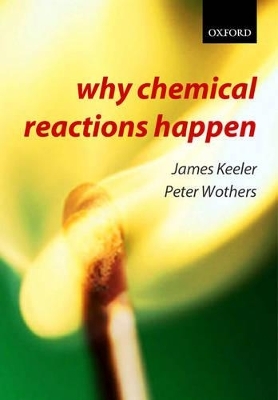
Why Chemical Reactions Happen
Oxford University Press (Verlag)
978-0-19-924973-2 (ISBN)
By tackling the most central ideas in chemistry, Why Chemical Reactions Happen provides the reader with all the tools and concepts needed to think like a chemist. The text takes a unified approach to the subject, aiming to help the reader develop a real overview of chemical processes, by avoiding the traditional divisions of physical, inorganic and organic chemistry.
To understand how chemical reactions happen we need to know about the bonding in molecules, how molecules interact, what determines whether an interaction is favourable or not, and what the outcome will be. Answering these questions requires an understanding of topics from quantum mechanics, through thermodynamics, to "curly arrows". In this book all of these topics are presented in a coherent and coordinated fashion, showing how each leads to a deeper understanding of chemical reactions.
James Keeler studied Chemistry at Oxford graduating in 1981. He continued at Oxford working under Professor Ray Freeman, FRS, on new techniques in high resolution NMR spectropscopy; he was awarded the D.Phil in 1984. Later that year he moved to the Department of Chemistry in Cambridge appointed first as a University Demonstrator, then subsequently as a University Lecturer and Senior Lecturer. His research interests continue in NMR and he has published around 60 papers in this area. In 1994 James was appointed as Director of Teaching in the Department. He is a Fellow of Selwyn College and there has been very involved in the teaching of Chemistry and the Natural Sciences, as well as other aspects of the academic and administrative life of the College. In 1989 he was awarded the Meldola Medal by the Royal Society of Chemistry and in 1998 he received a Pilkington Teaching Prize from the University of Cambridge. Peter Wothers studied Chemistry at Cambridge, graduating in 1991 before undertaking a PhD under Professor A.J.Kirby on stereoelectronic effects and conformational analysis in organic chemistry. In 1996 he was appointed to the newly established post of 'Teaching Fellow' in the Department of Chemistry. He lectures to the undergraduates and also runs the physical chemistry practical courses. He is involved in teaching chemistry to all age groups from giving demonstration lectures to the general public and school children to running courses for teachers designed to update their subject knowledge. In 2002 he was awarded a Pilkington Teaching Prize from the University. During his time at Cambridge, Peter has remained at St Catharine's College where, amongst other things, he is the Director of Studies in Chemistry.
1. What this book is about and who should read it ; 2. What makes a reaction go? ; 3. Ionic interactions ; 4. Electrons in atoms ; 5. Electrons in simple molecules ; 6. Electrons in larger molecules ; 7. Reactions ; 8. Equilibrium ; 9. Rates of reaction ; 10. Bonding in extended systems - conjugation ; 11. Substitution and elimination reactions ; 12. The effects of the solvent ; 13. Leaving groups ; 14. Competing reactions
| Erscheint lt. Verlag | 27.3.2003 |
|---|---|
| Zusatzinfo | numerous line figures |
| Verlagsort | Oxford |
| Sprache | englisch |
| Maße | 188 x 246 mm |
| Gewicht | 506 g |
| Themenwelt | Naturwissenschaften ► Chemie ► Anorganische Chemie |
| Naturwissenschaften ► Chemie ► Organische Chemie | |
| Naturwissenschaften ► Chemie ► Physikalische Chemie | |
| ISBN-10 | 0-19-924973-3 / 0199249733 |
| ISBN-13 | 978-0-19-924973-2 / 9780199249732 |
| Zustand | Neuware |
| Haben Sie eine Frage zum Produkt? |
aus dem Bereich


